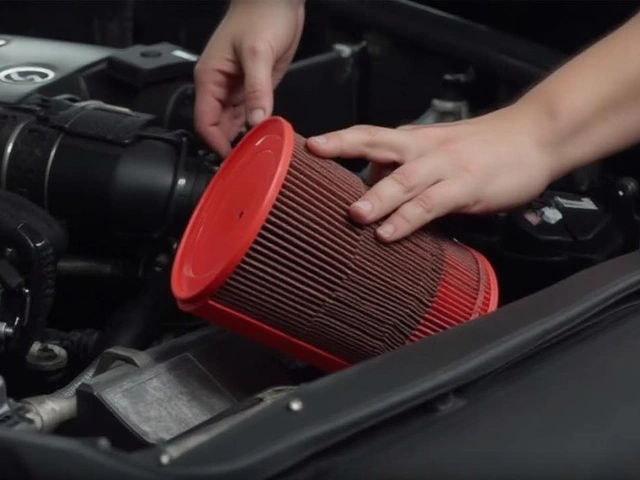Alloy wheels have taken the automotive world by storm, bringing both style and substance to the vehicles they adorn. Unlike the traditional steel wheels, alloy wheels are crafted from a blend of metals, commonly aluminum or magnesium, providing an impressive range of benefits that many car owners find irresistible.
In this article, we'll delve into what makes alloy wheels special, the materials used in their creation, and how this choice affects your driving experience. Whether you're a seasoned car enthusiast or simply looking to upgrade your ride, understanding the ins and outs of alloy wheels can help you make a well-informed decision for your vehicle.
- Introduction to Alloy Wheels
- Materials Used in Alloy Wheels
- Advantages of Alloy Wheels
- Comparing Alloy Wheels to Steel Wheels
- Maintenance Tips for Alloy Wheels
Introduction to Alloy Wheels
Alloy wheels have secured their place in the hearts of car enthusiasts and daily drivers alike, with a combination of aesthetics and performance benefits that are hard to ignore. These wheels are constructed from an alloy of aluminum or magnesium, sometimes including additional metals, thus inheriting a blend of properties that work to a vehicle's advantage. What sets them apart from conventional steel wheels is their ability to enhance both the visual appeal and the functionality of a vehicle. Over recent years, the popularity of alloy wheels has surged, as they offer both lightness and strength, creating a harmonious balance that appeals to those looking for improved performance alongside decreased weight.
When we talk about the manufacturing process, the technology behind alloy wheels is fascinating. The creation involves a sophisticated casting or forging process that involves melting metals and shaping them into molds or die-cast forms, followed by cool-down periods to ensure strength and resilience. While this might sound complex, it’s this meticulous process that gives alloy wheels their unique edge in terms of durability and lightness, allowing better heat dissipation which is crucial for high-speed driving or harsh conditions. The result is an enhancement in stopping power and handling, which can be particularly beneficial for performance-oriented vehicles.
"Alloy wheels are a critical component for those who value not just aesthetics, but also superior handling and performance," said Mike Weingart, an industry expert from Performance Wheels Magazine. "They offer a significant reduction in unsprung weight and assist with brake thermal management, which in turn translates to a better driving experience."
In addition, alloy wheels often come with intricate designs that can elevate the look of any vehicle, making them an ideal choice for car owners looking to add a personal touch to their rides. These wheels can be polished, painted, or left with a natural finish, offering a range of customization options that are not possible with traditional steel wheels. Though they might represent an initial investment that’s higher than steel options, the benefits, both functional and aesthetic, make them a compelling upgrade.
As vehicle technology continues to advance, alloy wheels remain at the forefront of innovation. They are more than just a fashion statement or a way to shave a few pounds off a vehicle's curb weight; they reflect a shift in how we think about materials and performance in the automotive sector. So, whether you’re drawn to their lightweight construction, thermal advantages, or their sleek designs, alloy wheels embody a perfect blend of form and function that continues to capture the imagination of car lovers around the globe.
Performance and Technology of Alloy Wheels
In terms of technology, alloys used in wheels are designed to withstand various stress factors such as bending, thermal shocks, and physical wear, which are common in everyday driving situations. This resilience is particularly important for sports car enthusiasts and those who participate in racing where wheels are subjected to extreme conditions. Hence, alloy wheels are not just a luxury but a necessity in particular applications. They’re engineered to reduce rotational mass compared with their steel counterparts, providing margins of efficiency by trimming overall vehicle weight. The reduction of rotating mass not only improves acceleration but also lowers fuel consumption, due to less energy being required to move the wheels.
The introduction of light alloys, infused with modern engineering techniques, has created a robust market for innovative wheel designs. From striking multi-spoke arrangements to more minimal and classic designs, alloy wheels have something for every taste. Considering the advantages linked to performance, efficiency, and aesthetics, it becomes clear why alloy wheels are favored by professionals and consumers alike who desire both beauty and substance in their gear.
Materials Used in Alloy Wheels
When it comes to the construction of alloy wheels, the choice of materials plays a pivotal role in determining their characteristics and performance. Primarily, these wheels are crafted from a blend of metals, typically aluminum or magnesium. The unique blend is not arbitrary; it's a strategic combination that offers the best of both worlds—strength and lightweight properties.
Aluminum alloys are a common choice because they strike a valuable balance between weight and durability. Aluminum's low density makes the wheels lighter than their steel counterparts, allowing for improved fuel efficiency and enhanced vehicle handling. This reduction in unsprung weight—the total mass lifted by the vehicle's springs—translates into better suspension performance, offering a smoother and more controlled ride experience. On the other hand, magnesium alloys are even lighter than aluminum, yet they maintain formidable strength and are favored in high-performance automobiles. Their use, however, requires careful consideration due to magnesium's susceptibility to corrosion.
The advantages of alloy wheels aren't just confined to performance. The aesthetic appeal they bring to a vehicle cannot be overstated. The malleability of the materials used in these wheels allows manufacturers to design intricate patterns and finishes, thus enhancing the car's visual allure. This flexibility in design is why you often see stunning, intricate spokes on alloy wheels, which can be polished, painted, or left bare to achieve the desired effect.
"Alloy wheels are not just a design trend—they are a technological upgrade." – Automotive Engineering InternationalIn addition to visual and performance benefits, the heat conduction property of aluminum is significant. This property is crucial in effectively dissipating heat generated from braking. By dispersing the heat rapidly, the risk of brake failure and wear is considerably reduced. This characteristic contributes significantly to the safety and longevity of the vehicle's braking system.
In the pursuit of advanced automotive technology, the exploration of new materials is ongoing. The integration of carbon fiber into alloy wheel construction is an emerging trend, aimed at further reducing weight and improving strength. While still in the experimental phase, carbon fiber reinforced polymer (CFRP) wheels promise unparalleled performance benefits, combining the lightweight nature of carbon fiber with the robustness of metal alloys.
In terms of composition specifics, alloy manufacturers follow a precise mix. Typically, the alloy consists of about 90-95% aluminum, with additional elements such as silicon to enhance casting capabilities and mechanical properties. The inclusion of copper and zinc can increase strength but may also make the alloy more susceptible to corrosion, so these elements are used cautiously. Understanding these material choices is critical for those looking to customize and upgrade their vehicle's aesthetics and performance through alloy wheels.

Advantages of Alloy Wheels
When it comes to upgrading your vehicle's wheels, opting for alloy wheels can deliver a variety of benefits that both enhance performance and improve aesthetics. The primary advantage of these wheels lies in their composition. Alloy wheels are typically crafted from a blend of metals like aluminum and magnesium. These materials are renowned for being significantly lighter than the traditional steel used in standard wheels, which can directly influence your car's performance. The reduced weight of alloy wheels helps in improving fuel efficiency as there is less mass to move, offering a smoother ride on long journeys.
Another notable benefit is the improved heat conductivity provided by alloy materials. This means that heat, which accumulates around the brakes during intense driving, is dissipated more effectively. This improvement reduces the likelihood of brake failure because more heat is carried away from the brake components. For those who live in areas prone to heavy traffic or enjoy spirited driving through windy roads, this characteristic can significantly enhance safety and reliability.
The aesthetic appeal of alloy wheels also plays a crucial role in their popularity. Car enthusiasts often love the sleek look and the variety of design options available, allowing for personalization to match the style statement they want their car to make. Alloy wheels offer a sophisticated appearance that can make even an ordinary vehicle stand out. The finish of these wheels often withstands corrosion better than steel, meaning they maintain their shine longer, even when exposed to harsh elements.
Impact on Vehicle Performance
From a purely performance-based perspective, the reduced weight of alloy wheels decreases unsprung mass, which can result in better suspension behavior. Vehicles with lower unsprung mass tend to have better contact with the road, improving grip and handling. This is why many high-performance sports cars favor alloy wheels. The agility that comes from better handling can contribute to a thrilling driving experience, particularly on winding roads or during evasive maneuvers.
"Alloy wheels have an incredible impact on vehicle performance, offering drivers enhanced handling and control," asserts Mark Johnson, an automotive expert at the World of Automotive Journal.
Maintenance and Durability
Alloy wheels do excel in many areas, however, they are not without their own requirements. It’s important to understand that while alloy wheels can resist corrosion more effectively, they can also be more susceptible to pitting and cracking, especially on rough surfaces. Regular maintenance and checks can help keep them in prime condition. It's always a good idea to clean them often and use protective coatings if possible. Data suggests that well-maintained alloy wheels can last as long as steel wheels, assuming proper care is taken, a fact that makes them a valuable investment in the long run.
Comparing Alloy Wheels to Steel Wheels
When talking about wheels, two major categories often enter the discussion: alloy wheels and steel wheels. Each has its own set of features, advantages, and drawbacks, and your choice can significantly affect your vehicle's performance and appearance. Alloy wheels, made from a mixture of metals like aluminum or magnesium, are known for their lightweight properties, offering improved handling and fuel efficiency. The reduced weight of the alloys leads to less unsprung mass, allowing the suspension to track the terrain more effectively, providing a smoother and more precise ride.
In contrast, steel wheels have been the traditional choice for decades, mainly due to their durability and cost-effectiveness. Made from composite alloys of iron with carbon, steel wheels are heavier than alloy wheels, which can be both a pro and a con depending on your driving needs. The extra heft provides greater stability in adverse weather conditions and is less susceptible to damage upon impact. However, this added weight can reduce fuel efficiency and may make the vehicle feel less agile.
One of the visual differences is the aesthetic appeal that alloy wheels bring. They come in various designs, finishes, and sizes, allowing for customization and enhancing the vehicle's overall look. Steel wheels, on the other hand, usually come in basic designs that may not be as visually appealing but are practical and easy to maintain. However, rust is more of a concern with steel compared to the corrosion resistance of alloys, especially in wet weather conditions.
Performance Considerations
When it comes to performance, alloy wheels provide significant benefits. The better heat dissipation that alloy wheels offer can reduce the risk of brake failure under extreme driving conditions. Lighter wheels also contribute to reducing the wear and tear on suspension components, as less weight trialing the suspension means more resilience and less force impact during turns. Steel wheels, however, are often praised for their sturdiness, making them a popular choice for off-roaders and those who frequently drive on rugged terrains.A common saying in the automotive world states,
"In the world of cars, reduce the unsprung mass, and the world becomes a smoother place,"which reflects the significance of wheel choice in driving experience. While alloy wheels may seem a pricy option upfront, their long-term benefits like fuel savings, improved handling, and aesthetics often justify the cost. Still, it ultimately boils down to the driver’s personal needs, driving environments, and aesthetic preferences. For those prioritizing durability and cost, steel wheels still hold their ground firmly.

Maintenance Tips for Alloy Wheels
Taking care of your alloy wheels ensures they not only look good but also maintain their structural integrity and performance over time. These wheels, while more durable than their steel counterparts, require specific care to combat any wear and tear they might endure on the road. Regular cleaning and inspection are pivotal in this process to keep any potential issues in check and extend the life of your wheels.
Regular washing with soap and water is one of the simplest yet most effective methods for maintaining your alloy wheels. Dirt, road salts, and brake dust can accumulate quickly on the wheel surface, potentially causing corrosion if left unchecked. Using gentle cleaners specifically designed for alloys helps preserve the protective coating that the wheels often have. Rinsing thoroughly and wiping them dry ensures that no residue is left behind, which could otherwise foster corrosion.
Inspecting Your Wheels
It’s important to routinely inspect your wheels for any signs of damage or unusual wear. Look for signs of scratches, dents, or curb rash, all of which can compromise the structural integrity of your wheels. If you notice any significant problems, it might be wise to consult a professional who can assess whether repairs are needed."Regular maintenance of alloy wheels can extend the lifespan of your tires by up to 25%," notes a report from the National Tire & Wheel Association.






